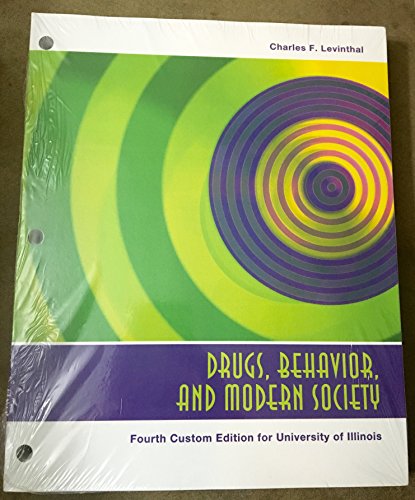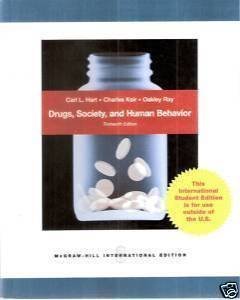Imagine stepping into a bustling city street, the air buzzing with energy and life. You see families laughing, children playing, and couples strolling hand-in-hand. Amidst this vibrant tapestry of human interaction, a hidden thread weaves its way, challenging our understanding of the delicate balance between individuals, substances, and society. This thread is the intricate interplay of drugs, society, and human behavior – a complex web that has intrigued scholars, policymakers, and individuals for centuries.

Image: www.abebooks.co.uk
The impact of drugs on society and human behavior is multifaceted and deeply pervasive. From the allure of pleasure to the burden of addiction, drugs touch every aspect of our social fabric, shaping our relationships, influencing our choices, and leaving their mark on our physical and mental well-being. This blog post delves into the captivating world of “Drugs, Society, and Human Behavior, 16th Edition,” exploring the latest findings, insights, and the ever-evolving discourse on this critical topic.
Understanding the 16th Edition: A Journey into the Heart of the Issue
The 16th edition of “Drugs, Society, and Human Behavior” stands as a cornerstone of knowledge in this field. It’s not just a textbook; it’s an invitation into a world where scientific understanding meets societal realities, where individual experiences intersect with broader social narratives. The book offers a holistic perspective, addressing a multitude of critical issues:
1. The Biological Basis of Drug Use and Addiction:
The book dives deep into the neuroscience of addiction, exploring how drugs interact with the brain’s reward system, leading to changes in brain structure and function. This section helps us understand the physiological mechanisms that underpin both the pleasurable effects of drugs and the compulsion to seek them out, even in the face of negative consequences.
2. Social, Cultural, and Environmental Influences:
No substance is an island. “Drugs, Society, and Human Behavior” recognizes that the use and abuse of drugs are intricately intertwined with social and cultural contexts. The book explores how factors like poverty, unemployment, family dynamics, peer pressure, and community norms play a significant role in shaping one’s vulnerability to drug use and the prevalence of substance abuse within specific communities.

Image: www.abebooks.com
3. The Evolution of Drug Policy and Treatment:
The 16th edition meticulously traces the historical trajectory of drug policy, from the era of prohibition to the current landscape of harm reduction and evidence-based treatment strategies. This historical analysis provides a critical lens for evaluating the effectiveness of current policies and for envisioning potential future directions, taking into account evolving scientific knowledge and changing societal attitudes.
4. The Impact of Drug Use on Individual and Societal Well-being:
Beyond the immediate consequences of drug use – accidents, overdoses, health complications – “Drugs, Society, and Human Behavior” examines the broader social implications. It addresses topics like crime and violence associated with drug trafficking, the economic costs of addiction, and the impact of drug use on families and communities. The book also explores the long-term consequences of substance abuse, including mental health issues, social isolation, and decreased productivity.
5. The Human Face of Addiction:
The book doesn’t shy away from the human experiences that sit at the heart of this complex issue. It explores the stories of individuals who are grappling with addiction, their struggles, their journeys, and their triumphs. These personal narratives offer a powerful way to connect with the emotional realities of drug use and addiction, humanizing the experience and reminding us that behind every statistic lies a human life.
Expert Insights: Navigating the Labyrinth of Drug Use
The authors of “Drugs, Society, and Human Behavior” are leading authorities in the field, their research and expertise providing valuable insights for understanding the dynamics of drug use. Here are some key takeaways from their work:
-
The Importance of Prevention: Preventing drug use from ever starting is the most effective first line of defense. This involves strategies like education, early intervention programs, building strong social networks, and fostering healthy coping mechanisms.
-
Evidence-Based Treatment : Treating addiction is not a one-size-fits-all approach. The 16th edition highlights the importance of evidence-based treatment approaches that tailor interventions to individual needs and circumstances. These approaches often involve a combination of therapies, medications, and support services.
-
The Role of Harm Reduction: The book emphasizes the importance of harm reduction strategies, which aim to minimize the negative consequences of drug use rather than simply focusing on its eradication. This can involve safe injection sites, needle exchange programs, and providing access to naloxone to reverse opioid overdoses.
-
The Need for Compassion and Understanding: The authors stress the importance of viewing individuals struggling with addiction not as moral failures but as individuals who need support, treatment, and compassion. Society’s response to drug use should be driven by understanding, empathy, and a commitment to helping people find pathways to recovery.
Actionable Tips: Moving Forward with Hope
Understanding the complexities of drugs, society, and human behavior is not just an academic pursuit; it’s an essential step towards building a more compassionate and informed society. Here are some actionable steps you can take:
-
Stay Informed: Keep up-to-date on the latest scientific findings, policy debates, and treatment approaches related to drug use and addiction.
-
Challenge Stigma: Speak up against negative stereotypes and misconceptions surrounding drug use and addiction, promoting open conversations and understanding.
-
Support Evidence-Based Policies: Advocate for policies that prioritize evidence-based approaches to preventing drug use, treating addiction, and reducing harm.
-
Engage in Your Community: Participate in local initiatives that address the needs of individuals struggling with addiction, supporting recovery programs, and advocating for better access to treatment services.
Drugs Society And Human Behavior 16th Edition
Conclusion: A Call to Action
Drugs, society, and human behavior are inextricably linked. “Drugs, Society, and Human Behavior, 16th Edition” offers a comprehensive and insightful exploration of this complex topic, providing a nuanced understanding of the dynamics at play. By embracing the book’s key takeaways and taking action, we can contribute to a society that prioritizes prevention, supports recovery, and approaches addiction with compassion and understanding. Let us move forward with hope, knowledge, and a commitment to creating a world where individuals struggling with addiction receive the support they need to lead healthy and fulfilling lives.






